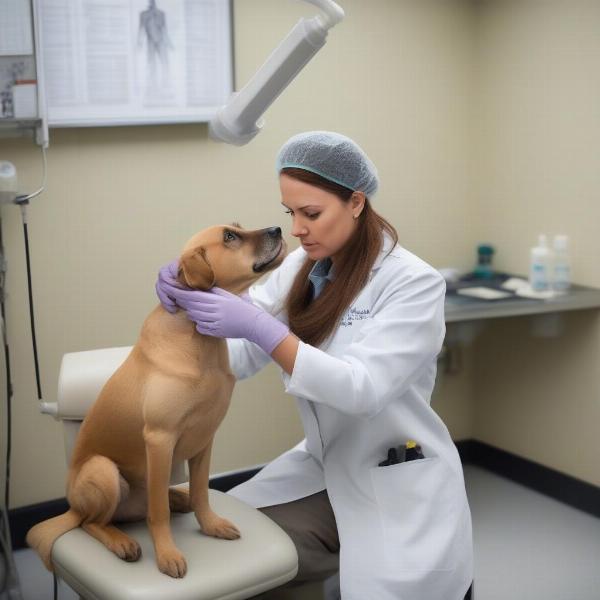Itching, scooting, and licking – if your dog’s rear end is the focus of their attention, you’re likely wondering why. “Why does my dog’s butt itch?” is a common question among dog owners. While occasional butt-itching can be normal, persistent scratching can be a sign of an underlying issue. This article will explore the various reasons why your dog’s butt might be itchy, from common causes like allergies to more serious conditions like parasites. We’ll also provide practical solutions to help relieve your furry friend’s discomfort and get them back to wagging their tail with joy.
There are several potential culprits behind your dog’s itchy butt. One of the most frequent reasons is allergies, which can be triggered by environmental factors like pollen or food ingredients. Parasites, such as fleas and worms, are another common cause, leading to intense itching and irritation. Poor hygiene, especially in long-haired breeds, can also contribute to the problem, as can impacted anal glands. Less commonly, skin infections and even more serious conditions like tumors can cause butt itching. Understanding these potential causes is the first step towards finding the right solution for your dog.
Common Causes of Itchy Butts in Dogs
Several common issues can make your dog’s rear end uncomfortable. These range from easily treatable problems to those requiring veterinary intervention.
Allergies
Just like humans, dogs can suffer from allergies. These can manifest in various ways, including itchy skin, especially around the butt. Food allergies can also lead to digestive upset, further exacerbating the problem. Identifying and eliminating the allergen is key to managing allergy-related itchiness.
Parasites
Fleas, ticks, and mites can all cause intense itching. Tapeworms, while internal parasites, can also contribute to anal irritation. Regular parasite prevention treatments are crucial for protecting your dog from these pests.
Impacted Anal Glands
Dogs have two small glands located on either side of their anus that secrete a foul-smelling fluid. These glands can sometimes become impacted, leading to discomfort and scooting. Regular expression of the anal glands, usually done by a veterinarian or groomer, can prevent this issue.
Less Common Causes
While less frequent, some underlying health issues can also manifest as an itchy butt. These warrant immediate veterinary attention.
Skin Infections
Bacterial or fungal infections can cause inflammation and itchiness around the anus. Your veterinarian can diagnose these infections and prescribe the appropriate medication.
Tumors
In rare cases, tumors around the anus can cause itching. If you notice any lumps or unusual growths, consult your vet immediately.
How to Relieve Your Dog’s Itchy Butt
Identifying the underlying cause is the first step. Once you know why your dog’s butt is itchy, you can take steps to alleviate their discomfort. dog itchy anus offers further insights. This might involve dietary changes for allergies, regular flea and tick prevention, or having their anal glands expressed. dog keeps biting butt provides helpful advice for addressing compulsive biting behaviors. For skin infections, your vet may prescribe medicated shampoos or ointments.
 Veterinarian examining dog's butt
Veterinarian examining dog's butt
Conclusion
A dog’s itchy butt can stem from various reasons, ranging from common allergies to less frequent conditions like infections. Observing your dog’s behavior and seeking veterinary advice are crucial for proper diagnosis and treatment. Addressing the underlying cause is key to relieving your dog’s discomfort and ensuring their well-being. dog biting butt provides more information. Regular grooming, a balanced diet, and preventative parasite control can also significantly contribute to maintaining a healthy and itch-free rear end for your furry friend.
FAQ
- Why does my dog keep licking their butt? Excessive licking can be a sign of itching, allergies, parasites, or impacted anal glands.
- How often should I have my dog’s anal glands expressed? This varies, but typically every few months or as needed if they’re showing signs of discomfort.
- Can food allergies cause an itchy butt? Yes, food allergies are a common culprit for skin irritation, including itchiness around the butt.
- What can I do at home to help my dog’s itchy butt? Consult with your vet first. They might recommend a warm compress, medicated wipes, or a change in diet.
- When should I take my dog to the vet for an itchy butt? If the itching is persistent, severe, or accompanied by other symptoms like bleeding or discharge, consult your vet immediately.
- Is scooting a sign of an itchy butt? Yes, scooting is a common sign of anal gland issues, which can cause itching and discomfort.
- Can dry skin cause an itchy butt in dogs? Yes, dry skin, particularly around the anus, can lead to itching and irritation. dry skin on dogs elbows provides further information on managing dry skin in dogs.
ILM Dog is a leading online resource for dog care and well-being. We offer expert advice on everything from breed selection and training to nutrition and health. Our goal is to empower dog owners with the knowledge and resources they need to provide the best possible care for their beloved companions. Whether you’re a new puppy parent or a seasoned dog owner, ILM Dog offers valuable insights and practical tips to help you navigate every stage of your dog’s life. For personalized advice and expert guidance, contact us at [email protected] or +44 20-3965-8624. Visit ILM Dog for more information.